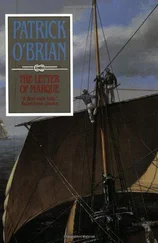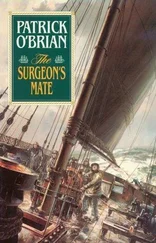Patrick O'Brian - The Ionian mission
Здесь есть возможность читать онлайн «Patrick O'Brian - The Ionian mission» — ознакомительный отрывок электронной книги совершенно бесплатно, а после прочтения отрывка купить полную версию. В некоторых случаях можно слушать аудио, скачать через торрент в формате fb2 и присутствует краткое содержание. Жанр: Книги. Описание произведения, (предисловие) а так же отзывы посетителей доступны на портале библиотеки ЛибКат.
- Название:The Ionian mission
- Автор:
- Жанр:
- Год:неизвестен
- ISBN:нет данных
- Рейтинг книги:3 / 5. Голосов: 1
-
Избранное:Добавить в избранное
- Отзывы:
-
Ваша оценка:
- 60
- 1
- 2
- 3
- 4
- 5
The Ionian mission: краткое содержание, описание и аннотация
Предлагаем к чтению аннотацию, описание, краткое содержание или предисловие (зависит от того, что написал сам автор книги «The Ionian mission»). Если вы не нашли необходимую информацию о книге — напишите в комментариях, мы постараемся отыскать её.
The Ionian mission — читать онлайн ознакомительный отрывок
Ниже представлен текст книги, разбитый по страницам. Система сохранения места последней прочитанной страницы, позволяет с удобством читать онлайн бесплатно книгу «The Ionian mission», без необходимости каждый раз заново искать на чём Вы остановились. Поставьте закладку, и сможете в любой момент перейти на страницу, на которой закончили чтение.
Интервал:
Закладка:
'Perfectly, I thank you,' said Stephen.
Mowett said 'Give way. Stretch out now.' The boat sprang into motion, moving faster and faster until it ran tilting up into the sand, checking with a hissing kiss. The bowman leapt out with a gangboard. Bonden led Stephen over the thwarts, said 'Mind your step, sir,' and he was ashore in France.
Five minutes, while Bonden struck a shaded light, lit Stephen's dark lantern and closed it, hung his other equipment round his neck in a little cloth bag, and made him put on his boat-cloak: then Mowett said very quietly, 'At half after four tomorrow morning in the same place, sir: or failing tomorrow the blue light at midnight and the next day at dawn."
'Just so,' said Stephen absently. 'Good night to you, now.' He walked up the slope in the yielding sand and as he went he heard the rattle of the gangboard, the boat's kiss in reverse, and the stroke of oars. Where the dunes began he stopped and sat down facing the water. He could see the lapping wavelets as they ran up the shore, and the stars reflected for a great way out, and the horizon; but no ship anywhere at all, nor even the boat. The only sound was the wind over the dunes and the lapping water down there: it was in a way the world at the very beginning -the elements alone, and starlight.
He was extremely unwilling to move. The sense of personal invulnerability that helped at the beginning of the war had left him long ago: he had been a prisoner the last time he was in France and although he had come away unharmed at least two of the French intelligence services had identified him beyond any possibility of a doubt. If he were taken now he could expect no mercy at all: he could not hope to come away untortured or alive. In earlier days he had faced much the same kind of fate, but then there had always been a certain chance of deceiving the other side or of escape: and in those days he was not married - his aims were single-hearted and in any case he cared less about his life.
Directly before him a glow appeared at one point of the horizon: it grew brighter, still brighter, and then the rim of the moon heaved up, almost painfully brilliant to his night-accustomed eyes. When it was clear of the sea, a gibbous, lumpish moon, he held his watch to his ear, pressed the repeater-stem, and counted the minute true chime. Both the watch and the moon told him that it was time to go, and standing up he paced deliberately down to the water's edge, where the wet sand not only made walking less laborious but also held no lasting trace.
Twice he stopped to argue with his unwillingness, and each time he looked out along the moon's path on the water: nothing whatsoever upon the sea, near or far. The bar at the mouth of the Aigouille lay before him at last, a broad strip of sand strewn with bleached tree-trunks: for except at times of flood most of the river stayed in its lagoons and marshes, the rest reaching the sea by a channel no wider than a man could leap. As he came to it he startled a night-heron fishing under the steep-to bank and for some reason the loud, harsh, familiar cry as it flew off, black and white in the moonlight, was a comfort to him. He made the leap successfully, whereas a few moments earlier he had been afraid that the bodily awkwardness that so often accompanies fear might make him blunder; and when he reached the far bank of the river he saw the two lights he was to look for, two lights one above the other far away in the direction of the shooting-box. His gentleman was there, and exact to the time; but to reach him Stephen must skirt the lagoon, following a fisherman's path to a wooded knoll, and then strike across through the reed-beds for the dyke, passing three small pools on his way.
At this end the path was clear enough and firm underfoot: it led him round a tongue of dry land to a shallow inlet full of wading birds that fled away with desolate fluting cries. And indeed, although the marsh gave an impression of silence - silent water gleaming under a silent moon - there was in fact a good deal of sound quite apart from the soughing of the wind in the reeds: over on his left he could hear the sleepy gabble of flamingoes, gooselike but deeper; duck flew overhead quite often, their wings creaking; and at the far edge of the reed-beds that he must traverse to reach the dyke, perhaps a mile away, a bittern began its foghorn song, boom, boom, boom, as regular as a minute-gun. He reached the knoll (an island once) with its tumbledown hut and the eel-traps hanging in a willow-tree: there were rabbits here, and while he was searching for his landmarks he heard one taken by a stoat.
On, and into the reed-beds: here it was night again, with very little moon coming down through the long leaves overhead. There was a path of sorts, and his lantern, unshaded now, showed him a cut reed here and there; but much of the way he had to push through, sometimes striding high over dead or fallen stems, often ankle-deep in ancient-smelling mud, always too hot in the cloak and sadly plagued by the mosquitoes he disturbed in his passage; and in any case there was little certainty about the path; others crossed it or merged with it or forked off, confusing the direction. These were certainly made by wild boars and at one point he heard a band of them moving about, snorting. But boars did not interest him very much: what almost frivolously occupied the top of his mind, riding above his eagerness for the meeting and its success, and above his deep and sometimes almost paralysing sense of fear, was the bittern. He was going directly towards it; the sound was astonishingly loud by now, and he thought the bird might be at the edge of the reeds fringing the next pool, whose far end was formed by the dyke itself. If only he could move quietly enough and if only luck were with him, he might see it standing in the moonlight. Though indeed the moon would not last much longer: every time he looked up out of his dense cover he saw more and more clouds in the sky, and although he could not be sure of the direction they now appeared to be coming from the south.
As far as luck was concerned, it seemed to be with him, decidedly with him so far, for although it was impossible to move without at least some rustling he was getting closer and closer, so close now that he could hear the bird's hoarse straining indraught and the small private note that preceded the enormous boom. The bittern did not mind the noise he made; and perhaps mistaking him for a boar it did not even take fright when a false step sent him splashing knee-deep in the mud. But when a high, nervous voice called from the reeds ahead 'Halte Ide. Qui vive?' it instantly fell silent, although it had taken a full breath.
'Le docteur Ralphe,' answered Stephen.
The voice made the agreed reply, claiming to be Voltaire, though from the sound it was clear to Stephen that he was an agent named Leclerc. 'I expected to find you on the dyke,' he said, examining Leclerc as the moon shone bright through parting clouds. Leclerc explained that he had heard movements on the farther marsh and that he had felt too visible, perched up there. Only cows, perhaps, but possibly poachers or smugglers - it was a great place for smugglers - and it was wiser not to call attention to himself. He had left the horses at the shooting-box, not liking to ride out, they being so nervous tonight. 'I do not wonder at it,' said Stephen to himself. 'If they have caught half your hurry of spirits they must be fit to take to the air.' Leclerc was a clever fellow, but Stephen would never have chosen him for this assignment; he was a townsman through and through, and townsmen were often ill at ease on a marsh or a mountainside by night. Besides, he had the wrong temperament entirely.
They were on the dyke, and from here the farther marsh could be seen, mostly rough pasture criss-crossed with shining ditches, but with clumps of tamarisks and taller trees here and there as well as great stretches of reed, and in places one could make out the windings of the road to Mandiargues and the canal of the same name. As they walked along Leclerc named the men who had arrived at the rendezvous by the time he left and he was speaking of those who were still expected when two large pure white shapes rose into the air from just under the dyke. 'Oh my God,' he cried, clutching Stephen's elbow. 'What was that?'
Читать дальшеИнтервал:
Закладка:
Похожие книги на «The Ionian mission»
Представляем Вашему вниманию похожие книги на «The Ionian mission» списком для выбора. Мы отобрали схожую по названию и смыслу литературу в надежде предоставить читателям больше вариантов отыскать новые, интересные, ещё непрочитанные произведения.
Обсуждение, отзывы о книге «The Ionian mission» и просто собственные мнения читателей. Оставьте ваши комментарии, напишите, что Вы думаете о произведении, его смысле или главных героях. Укажите что конкретно понравилось, а что нет, и почему Вы так считаете.












